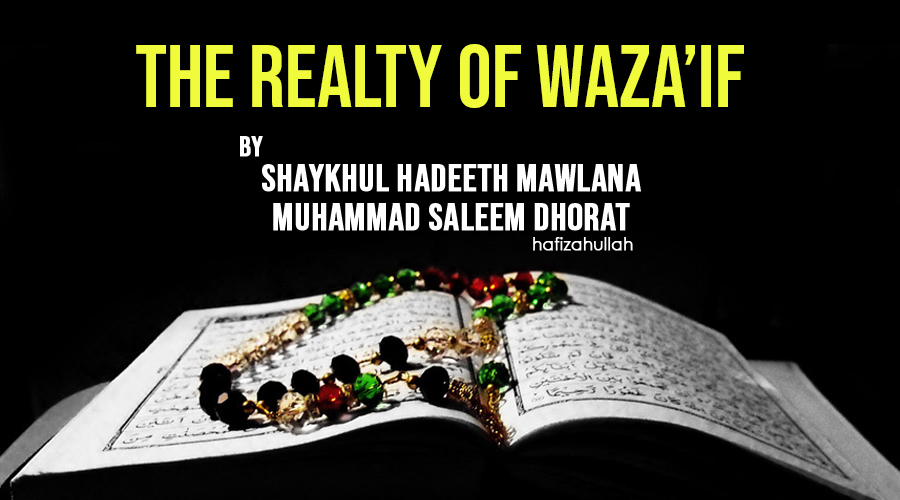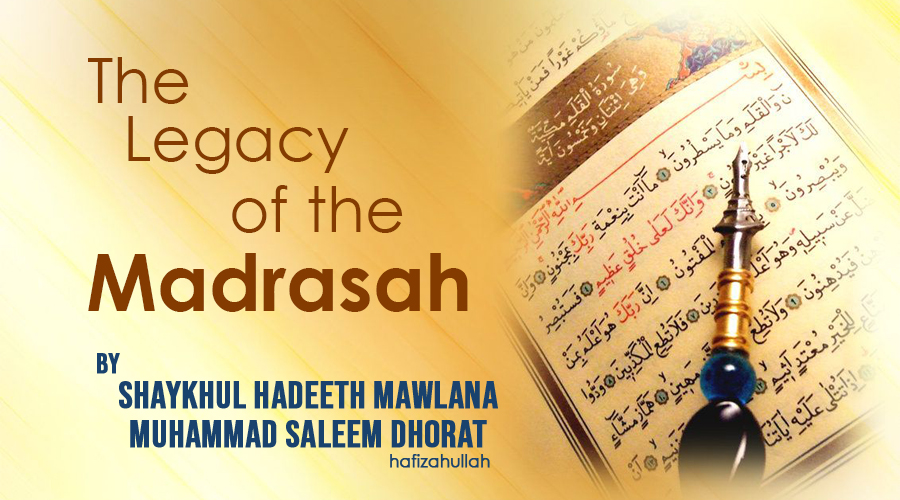
The Reality Of Wazaif
When struck by an illness, difficulty or calamity, it is natural for us to try our best to relieve ourselves of it. Allāh سُبْحَانَهُ وَ تَعَالَى, being our Creator, is well aware of this, and consequently, He has not only permitted, but also encouraged us to adopt means that help us to remove the difficulty we find ourselves in. However, due to our limited understanding and knowledge, we do not adopt the correct means, or if we do, then we do not adopt them suitably.
There are two types of means that we can utilise to help us at a time of difficulty: spiritual and worldly. From these, we should always adopt spiritual resources first. Adopting spiritual resources means turning to Allāh سُبْحَانَهُ وَ تَعَالَى.
This in itself further comprises two parts: the first is to assess our lives and see where we are faltering in our obedience to Allāh سُبْحَانَهُ وَ تَعَالَى; having realised this, we should strive towards rectification through tawbah and istighfār. The second part is to make du‘ā to Allāh سُبْحَانَهُ وَ تَعَالَى and ask Him to fulfil our needs and remove the difficulty. After this, we should adopt suitable and permissible worldly resources.
Those who are ill should take advice from an experienced and qualified doctor and follow his advice. Those involved in a court case should seek help from an experienced lawyer. However, we must ensure that in adopting worldly resources we do not do anything contrary to the Pleasure of the Creator.
Common Mistakes
After understanding the correct procedure to follow when trying to remove difficulties, let us now look at some common mistakes made in this regard. Those Muslims who do not follow the Sharī‘ah do not adopt spiritual resources at all. Their attention is entirely on worldly resources. We must remember that these means will only prove beneficial if Allāh سُبْحَانَهُ وَ تَعَالَى wills. Therefore, without turning to Allāh سُبْحَانَهُ وَ تَعَالَى there is no guarantee of success.
Those who, to some degree, do follow the injunctions of the Sharī‘ah, adopt spiritual resources, but do so according to their own limited understanding.
A common mistake is giving too much importance to waẓā’if. (Waẓā’if refers to the recitation of certain verse(s), name(s) of Allāh سُبْحَانَهُ وَ تَعَالَى etc. a certain number of times to fulfil a particular need.) Too much attention on waẓā’if can lead people to overlook the importance given to du‘ā by our Sharī‘ah, and as a result, it is not valued as it should be.
Du‘ā is considered to be something ‘common’, ‘ordinary’ and ‘simple’. And because waẓā’if have special quantities, prerequisites etc. attached, they appear as something special. As a result, people are more inclined towards waẓā’if than they are to du‘ā, whereas in reality, du‘ā is the key to solving our problems.
Even though waẓā’if can be of benefit, there is a very big difference between them and du‘ā. Du‘ā will be counted as an ‘ibādah, even if it be for a worldly item, such as a job, good health or passing a driving test. However, as far as waẓā’if are concerned, their recitation will not be rewarded as they are not classed as ibādah. Another distinction is that while making du‘ā we rely solely on Allāh سُبْحَانَهُ وَ تَعَالَى, aware that it is only Allāh سُبْحَانَهُ وَ تَعَالَى who in reality can help us, solve our problems and remove our difficulties. With waẓā’if, our attention diverts towards the ‘power’ of the waẓā’if.
The Reality of Waẓā’if
In essence, it is only Allāh سُبْحَانَهُ وَ تَعَالَى who removes difficulties, and du‘ā is to ask Allāh سُبْحَانَهُ وَ تَعَالَى to do just that. What chance is there of attracting the Help of Allāh سُبْحَانَهُ وَ تَعَالَى through wazā’if if the person reciting them does not have any connection with Him?
Once a person came to Shaykh Ya‘qūb Majaddidi and asked him to explain the reality of waẓā’if. The Shaykh did not give him a direct answer, but instead explained through an example, making use of a police officer who was present nearby. The Shaykh asked, “If you were to say to this policeman, ‘You are fired!’ What will happen?” The person replied, “Nothing, it will have no impact whatsoever.”
The Shaykh then asked, “What if you were to repeat the sentence a hundred times?” The reply was the same. The Shaykh further asked, “What if you were to sit with a tasbīḥ (prayer beads) and repeat it a thousand times?” Again he gave the same reply, that it would make no difference whatsoever. The Shaykh then asked him how he could fire the policeman.
The person explained that he would need to join the police force and work hard until he became the policeman’s superior. Then just saying ‘You are fired’ once would be enough to have him removed. The Shaykh then explained that this is the same case with waẓā’if. If a person were to recite a certain verse, name of Allāh سُبْحَانَهُ وَ تَعَالَى etc. a thousand times, it will have no effect until and unless the person acquires a position in Allāh سُبْحَانَهُ وَ تَعَالَى eyes and becomes beloved to Him.
Once he does so, he will just have to make du‘ā once and Allāh سُبْحَانَهُ وَ تَعَالَى will accept it. Rasūlullāh s has said: “There are many who are dishevelled, covered in dust, turned away from people’s doors, who, if they were to take an oath by Allāh, Allāh سُبْحَانَهُ وَ تَعَالَى would surely carry it out.” (Muslim)
“(When my servant becomes my beloved) and he asks from me, I will grant him.” (Bukhārī)
Turning To Allāh سُبْحَانَهُ وَ تَعَالَى Completely
There are many who do turn to Allāh سُبْحَانَهُ وَ تَعَالَى and engage in du‘ā, but do not realise that there are certain obstacles that prevent the du‘ā from being accepted. One major obstacle is disobedience to Allāh سُبْحَانَهُ وَ تَعَالَى; therefore, we need to turn to Allāh سُبْحَانَهُ وَ تَعَالَى completely, after making a full assessment of our lives. For example, someone neglectful of ṣalah needs to become punctual with ṣalah; someone involved in a particular sin needs to stop that sin immediately and repent. This is because it is very possible that the difficulty afflicting us is due to a sin we are committing, and du‘ā will not bear fruit if the cause of the difficulty remains. Therefore, repenting from sin and changing one’s life for the better is also a necessity for the acceptance of du‘ā.
Allāh سُبْحَانَهُ وَ تَعَالَى’s Will
If after adopting all these means, the difficulty is still not removed, then we should remember that Allāh سُبْحَانَهُ وَ تَعَالَى is Ḥakīm (The Most Wise) and Ḥākim (The Supreme Ruler). It is very possible that Allāh سُبْحَانَهُ وَ تَعَالَى has something better in mind for us. While wishing for the difficulty to be removed, we may be unaware of the benefits hidden in it. However, Allāh سُبْحَانَهُ وَ تَعَالَى knowledge is complete and He knows what is better for us in the long term. Therefore, if a difficulty remains then we should remain content and happy with Allāh سُبْحَانَهُ وَ تَعَالَى decision. From the aḥādīth we learn that the du‘ās of a believer are invariably accepted (provided their requisites have been fulfilled), but their acceptance is manifested in either of the following three ways: a) sometimes Allah immediately answers them and blesses the seeker with what was asked for; b) sometimes He substitutes what was asked for with something that in His Knowledge is better for the seeker; c) alternatively, through the blessings of the du‘ā, He removes an impending calamity that was to befall the seeker. At times, none of the above is the case, and instead, the du‘ā is saved for the hereafter. Such unanswered du‘ās will bear so much reward in the hereafter that the seeker will wish that none of his du‘ās had been accepted in the world. (Kanzul ‘Ummāl)



